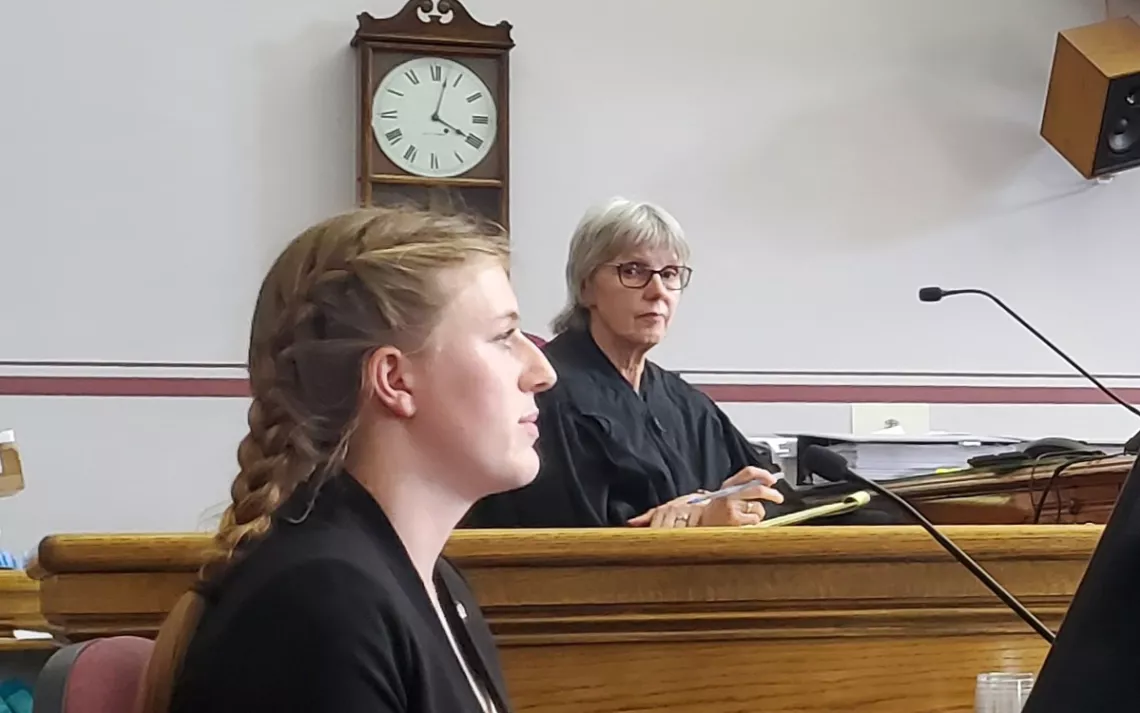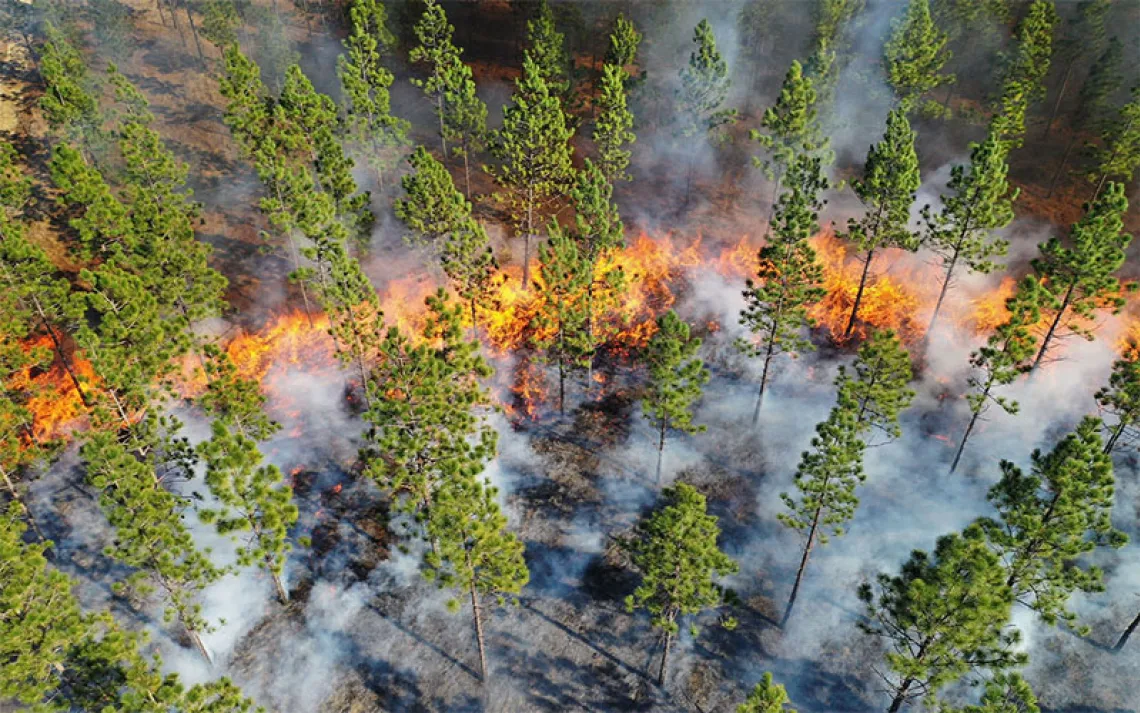Does Montana Owe Its Young People a Livable Future?
Day one of the historic youth climate trial in Helena

Grace Gibson-Snyder testifies on opening day while Judge Kathy Seeley looks on. | Photo by Elisabeth Kwak
On Monday, the 16 young plaintiffs in the landmark climate case Held v. State of Montana finally got their day in court, as the two-week trial opened with tears, laughter, and a master class in climate science. The plaintiffs, now ages five to 22, are suing their home state for depriving them of their right under the state constitution to “a clean and healthful environment” through its support for fossil fuels. The case could have far-reaching implications for the ability of citizens to force policy changes through the courts.
The plaintiffs arrived at First District Judicial Court in Helena to a cheering, sign-waving crowd of about 50 well-wishers outside the courthouse. Many watched a livestream of the proceedings in a nearby theater, and hundreds more tuned in from elsewhere, according to one of the plaintiffs’ law firms, Our Children’s Trust.
Inside, plaintiff attorney Roger Sullivan of McGarvey Law in Kalispell laid out the youths’ case. “This case is about the equal rights of children,” he told the court, “and their protection from the extraordinary dangers of fossil fuel pollution and the climate crisis that the state is exposing them to.” His opening statement detailed the plaintiffs’ list of witnesses, which includes scientists, doctors, environment and energy experts, and some of the plaintiffs themselves.
Montana’s defense kept its opener brief in comparison. “The court will hear lots of emotions, lots of assumptions, accusation, speculation . . . and notably, fear about what the future may hold,” said Assistant Attorney General Michael Russell. “However, in reality, the substance of this case as it currently exists is far more boring than the plaintiffs would like.” Russell argued that changes to the Montana Environmental Protection Act, or MEPA, the state statute on which the lawsuit hinges, wouldn’t improve Montana’s climate. “Montana’s emissions are simply too minuscule to make a difference. Climate change is a global issue that effectively relegates Montana’s role to that of spectator.”
Now is the time for environmental journalism.
Sign up for your Sierra magazine subscription.

Rikki Held, 22, the oldest plaintiff and the one after whom the case is named, was the first to take the stand. At times fighting tears, she described how drought, floods, extreme heat, and wildfire smoke have affected her life on her family’s cattle ranch outside of Broadus. Held recalled ash falling from the sky during 2021’s Lame Deer Fire, losing electricity on her ranch for a month after the 2012 Ash Creek Fire, working outdoors on 110°F days, and the stress of caring for cattle as their typical water sources became scarce.
“Breathing in the smoke, you feel it in your throat and eyes,” Held testified. “It also has mental impacts. Knowing that we could do something to prevent or change that.”
Held said winning the lawsuit would make her more hopeful for the future. “I know that climate change is a global issue, but Montana needs to take responsibility for our part in that. We can’t just blow it off and do nothing about it.”
Plaintiff Katherine “Grace” Gibson-Snyder of Missoula, 19, testified about having many of her high school soccer practices canceled due to wildfire smoke, rafting the Clark Fork River when the water was so low her father had to drag the raft, and watching the Sexton Glacier in Glacier National Park melt, an experience she called “devastating.” Gibson-Snyder said she wanted to raise a family, but because of the chance they might suffer from the accelerating impacts of climate change, “I’m not sure if I can morally or ethically have children of my own.”
Gibson-Snyder was asked if Montana had a responsibility to her. “I am a citizen. Yeah, they do have a responsibility to me. It’s my belief that the role of government is to protect its people,” she said. “When they are actively making choices that are shown to harm the people at hand, that is a betrayal of the people.”
Plaintiff Eva (whose last name was withheld), 17, of Livingston, detailed living through several major river floods and wildfire smoke events. “My future feels uncertain,” she said. As with the other young plaintiffs, the defense declined to cross-examine her.
Beyond the plaintiffs’ testimony, much of the day was a crash course in climate science and constitutional history. Steven Running, a climate scientist who shared the 2007 Nobel Peace Prize for his work on an Intergovernmental Panel on Climate Change (IPCC) report, spent more than two hours on the stand interpreting graphs and explaining the link between worsening climate impacts and the burning of fossil fuels. He reviewed several of what he called the most authoritative scientific papers on climate change as well as the latest IPCC climate assessment, though the defense objected to all of them on the basis that they were hearsay. Judge Kathy Seeley allowed the discussion to continue.
Running described climate change’s impacts to wildlife like snowshoe hares, prompting an objection from the state that he was not a wildlife biologist. “I was a coauthor on this paper,” Running shot back, to laughter in the courtroom.
“In your opinion, is human-caused climate change harming these young Montanans?” a plaintiffs’ lawyer asked him. “It’s harming all of us, including and especially these young people," Running said.
During cross-examination, defense lawyer Mark Stermitz asked if the judge ordering Montana to cease using fossil fuels would bring the climate to the point where the plaintiffs are no longer being harmed. “We can’t tell in advance because what has been shown in history over and over and over again is that when a significant social movement is needed, it often is started by one or two or three people,” Running said. “If our state decided to do what you’re hypothesizing, we can’t tell how many other states would decide that’s the right thing to do, and we’re going to do it too. Then extrapolate that to countries all around the world.”
“Is that a scientific opinion or a personal opinion?” Stermitz asked.
“That probably gets to be half of each,” Running answered.
The plaintiffs also called Mae Nan Ellingson, who was the youngest delegate to the 1972 constitutional convention in Montana. She described the delegates’ commitment to including the right to “a clean and healthful environment” in several places in the state constitution.
Afterward, sisters Quynh McKelvey-Phan, 16, and Mai McKelvey-Phan, 13, said they had gotten up at 5:30 a.m. to drive from their home in Missoula to attend the trial. “Our mom wanted us to watch history in the making,” Quynh said. “I’m just really happy that we were able to get our voices heard in the state, and hopefully this becomes something much bigger than it currently is.”
The trial is scheduled to run on weekdays until June 23. A livestream of the proceedings is available daily.
 The Magazine of The Sierra Club
The Magazine of The Sierra Club



